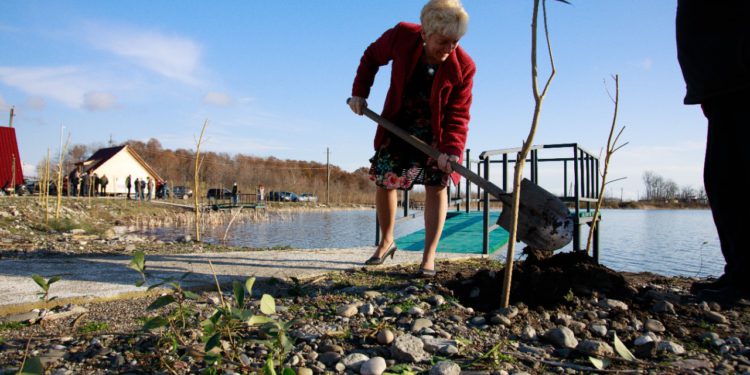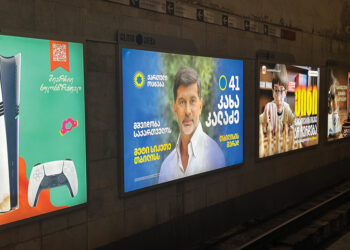With the COVID-19 crisis constraining people’s lives and livelihoods, local initiatives are vital to revive the economy, protect jobs and help communities chart a course to recovery and robust growth. With funding from Switzerland, Austria and Denmark, the United Nations Development Programme (UNDP) in Georgia is supporting dozens of community-based projects, with a focus on assisting vulnerable groups and conflict-affected communities.
The positive impact of this work was visible on 16-19 March 2021, when UNDP Head Louisa Vinton and Deputy Minister of Regional Development and Infrastructure Mzia Giorgobiani visited eight municipalities in four different regions – Chiatura, Zestaponi, Kutaisi, Khoni, Tsageri, Lanchkhuti, Poti and Zugdidi – to meet with local authorities and civil society activists, initiate new development projects and deliver assistance to local self-governments and communities.
As part of a broader pandemic-inspired initiative, Vintonhanded over IT equipment for the use of village heads in Chiatura, Zestaponi, Kutaisi and Tsageri to simplify communication between outlying rural communities and municipal centers. The packages have been presented to 136 village heads in all, as a way of bringing e-services closer to the people who need them.
Vinton and Giorgobiani also met with young activists who received UNDP support through a Danish-funded program fostering local civic activism and helping local self-governments deliver quality services. In Chiatura, young people painted colorful murals on defaced city walls, beautified a local bridge and built a climbing wall for aspiring mountaineers. In Zestaponi, UNDP helped the municipality undertake a pilot project in waste separation and recycling, in which schools received books and prizes in exchange for paper and plastic collected. This initiative won a national prize. And in Kutaisi, UNDP helped to develop an interactive website to enable citizens to alert authorities to potholes and other city problems.
Vinton and Giorgobiani next traveled to the mountainous Khreiti settlement, where UNDP with Danish funding installed solar panels on the roof of a local kindergarten, providing its 50 pupils with an eco-friendly heating and hot water system.
“The decisions that affect the quality of people’s lives are most often made at the local level,” said Vinton. “We are seeing first-hand how modest outside support can unleash local energy and creativity to tackle social and economic challenges. This is the spirit we need to encourage in order to ensure that Georgia emerges from the pandemic stronger than before.”
Vinton and Giorgobiani also visited a number of municipal and community-based local economic development initiatives that are part of a program implemented by UNDP in partnership with the MRDI with funding from Switzerland and Austria. These included a refurbished Tourism Information Centre in Tsageri; new craft pavilions constructed at a popular recreation spot along the Atsaura River in Lanchkhuti; and a new recreational fishing facility built on the shores of Lake Martotskala near Poti. In Lanchkhuti, the party also stopped for refreshments at Keto’s Café, a thriving eatery and catering business that employs persons with disabilities and was a winner of the Social Impact Award 2020. These undertakings are just four of the 29 LED initiatives that UNDP is currently supporting in four regions with a total value of USD 965,805.
“The Government of Georgia joins efforts with international partners to support local economic initiatives that will contribute to the crisis recovery and improve the economic environment on local and national levels after the pandemic and beyond,” said Deputy Minister Giorgobiani.
Vinton’s agenda also included collective centers for internally displaced persons (IDPs) in Khoni and Zugdidi. As part of a broader program to protect vulnerable IDPs from pandemic shocks, UNDP has been delivering sanitary and hygienic supplies to the 100 collective centers with the worst living conditions. UNDP’s partner NGO, the Charity Humanitarian Center “Abkhazeti“ (CHCA), also provided food packages for at-risk households. The Zugdidi center is home to one of ten “e-learning community centers “ established by UNDP to help women residents develop IT skills. Each center is equipped with computers and Internet access and has a designated resident trainer. The Zugdidi collective center is also the site of one of 25 “quick fix“ projects undertaken by UNDP to repair bathrooms and improve water supplies for IDPs.














